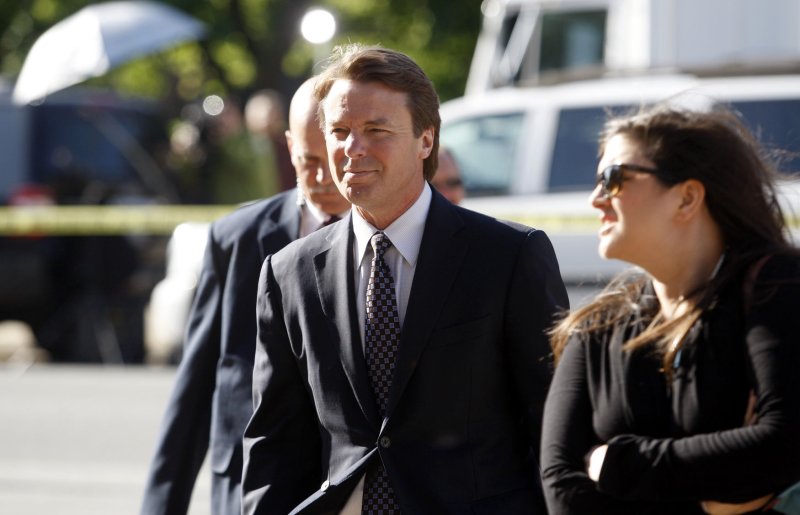1 of 4 | Former U.S. Senator and presidential candidate John Edwards arrives with his daughter Cate at the federal courthouse in Greensboro, North Carolina on April 24, 2012. UPI/Nell Redmond |
License Photo
GREENSBORO, N.C., April 23 (UPI) -- The conduct of a key witness came into question Monday, as the campaign finance violation trial of former U.S. Sen. John Edwards D-N.C., opened in Greensboro.
After 12 jurors and four alternates were picked for the case, U.S. District Judge Catherine Eagles ruled defense attorneys could mention in opening statements that Andrew Young, a former Edward aide and a prosecution witness, had contacted three witnesses on the defense list to feel out what they planned to say on the stand, The (Raleigh) News & Observer reported.
In his opening statement, prosecutor David Harbach acknowledged Young, who allegedly helped direct hundreds of thousands of dollars from two wealthy Edwards supporters to living expenses for Edwards' mistress, Rielle Hunter, would be testifying in "hopes of not being prosecuted."
"You're going to hear he's been less than truthful in the past," Harbach said. "You will not like him. But remember this, Young is an exhibit as well as a witness."
Defense attorney Allison Van Laningham said Young had been willing to do whatever Edwards asked as long as it forwarded his career.
Prosecutors allege Edwards knowingly broke U.S. campaign finance laws when he failed to report nearly $1 million in donations from supporters. His lawyers contend the donations weren't political.
Edwards, 58, the 2004 Democratic vice presidential nominee, is charged with six felony counts, four involving the alleged acceptance of $933,000 in illegal campaign contributions during his failed 2008 bid for the Democratic presidential nomination. He also faces charges of conspiracy and making false statements.
The government contends Edwards knowingly used the unreported payments to pay the expenses of Hunter -- who once made videos for Edwards' campaign -- and a daughter the couple conceived, and hide the affair from voters. The donors had already given the maximum allowed by law.
Edwards -- John Kerry's running mate in 2004 -- had a public campaign image of a devoted family man.
"The charges against John Edwards in this case flow from his knowing and willful violation of the federal campaign finance laws during his campaign for the Democratic Party's nomination for president," prosecutors alleged in court filings.
Edwards' defense team contends the contributions by from benefactors Rachel "Bunny" Mellon, a 101-year-old Virginia banking heiress, and the late Fred Baron, a Texas lawyer, were not political donations but personal gifts intended only to keep his wife, Elizabeth Edwards, who was publicly struggling with cancer, from finding out about the continuation of the affair, which he had told her was over, and to hide that a child was involved.
Elizabeth Edwards separated from Edwards in January 2010 and died in December of that year.
Defense lawyers deny John Edwards initially knew about the money -- that it was all the work of Young, the former campaign aide they said wanted to protect Edwards. Young initially falsely claimed paternity of the baby girl to protect his married boss, who at first denied he was the father.
Edwards' lawyers argue because gift taxes were paid on the money and it was not funneled through traditional campaign accounts, it was not a campaign contribution in any case.
Justice Department lawyers counter the money was used to try to influence the election. They say if the public found out about the affair and the child, Edwards' presidential bid would been ruined.
Edwards could face as much as 30 years in prison and $1.5 million in fines if convicted.
Young renounced the paternity claim and wrote in a tell-all book, "The Politician," Edwards knew all along he was the girl's father but pleaded with Young to accept responsibility.
The defense argued in a trial brief the payments by Mellon and Baron covered Hunter's personal expenses "and, much more so, the Youngs' personal expenses, such as construction of their dream home, not Mr. Edwards' expenses.''















